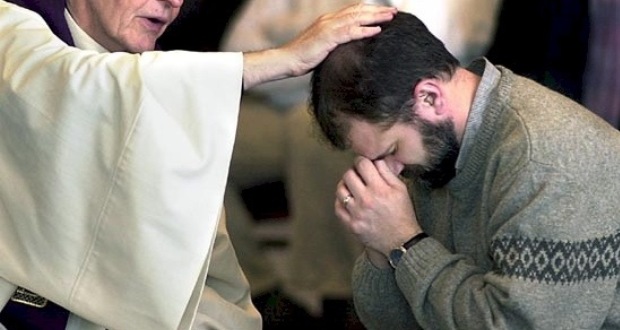Jesus Is Angered By Those Who Blaspheme Against The Holy Spirit

The refusal to accept the salvation which God offers to man through the Holy Spirit . . .
[simpleazon-image align=”left” asin=”1941663125″ locale=”us” height=”375″ src=”http://ecx.images-amazon.com/images/I/51jBCCu9MwL.jpg” width=”247″]In the Gospel reading this Sunday, Jesus has arrived at what must have been for him a very difficult, very challenging and even painful conflict since it involved not just his usual opponents the scribes and other religious leaders, but even the members of his own family. At some time or the other we have all arrived at this point where we have had to take a stand even against our own relatives, the people that we love or who grew up with us on issues such as the church’s teaching on sexual morality, social justice, race or even politics. We need not see “relatives” only in a literal sense. We have all had “relatives” in the form of good friends of ours who “set out to take charge of us convinced that we were out of our minds.” We stand up for the rights of people we believe to be oppressed, we enter into an interracial marriage, we publicly declare our support for a particular political party or political leader.
As with Jesus, our public stance elicits very harsh reactions from those who disagree with us. Jesus’ opponents , the scribes who had come down from Jerusalem declared that “Beelzebul is in him and ‘it is through the prince of devils that he casts devils out.” All around the world we have all experienced the demonization that can come even within the church as people take up stances on various issues. In politics one may hear that you are “evil” because you agree with the Democrats, or with the PNM or with the UNC or the Conservatives or with the Labour Party.
Jesus replies in a very forceful and pointed manner to his opponents with a little parable about the struggle with evil that also allows him to show the sheer magnitude and scope of God’s forgiveness and give a very important teaching on the ‘eternal’ sin – blasphemy against the Holy Spirit. What does Jesus mean by blasphemy against the Holy Spirit? Here I can do no better than to quote Pope John Paul II in his Encyclical on the Holy Spirit Dominum et Vivificantem. In article 46 the pope writes:
Why is blasphemy against the Holy Spirit unforgivable? How should this blasphemy be understood ? St. Thomas Aquinas replies that it is a question of a sin that is “unforgivable by its very nature, insofar as it excludes the elements through which the forgiveness of sin takes place.”
According to such an exegesis, “blasphemy” does not properly consist in offending against the Holy Spirit in words; it consists rather in the refusal to accept the salvation which God offers to man through the Holy Spirit, working through the power of the Cross.
The pope notes that the sin cannot be forgiven because it is linked to ‘non-repentance.’ .
“If Jesus says that blasphemy against the Holy Spirit cannot be forgiven either in this life or in the next, it is because this “non-forgiveness” is linked, as to its cause, to “non-repentance,” in other words to the radical refusal to be converted.” The person cannot be forgiven because he/she simply does not want it.
Pope John Paul goes on to add:
…Blasphemy against the Holy Spirit, then, is the sin committed by the person who claims to have a “right” to persist in evil-in any sin at all-and who thus rejects Redemption. One closes oneself up in sin, thus making impossible one’s conversion, and consequently the remission of sins, which one considers not essential or not important for one’s life.
What Jesus and following him, the pope describes is a blanket refusal to accept the power of God in the world and in other people. This radical refusal to accept God’s power caused the scribes to say of Jesus “An unclean spirit is in him.” This refusal to accept the evidence of God’s goodness – especially when it appears in the work done by people with whom we may disagree politically or philosophically may be rooted in malice and hostility. It causes us to disbelieve the evidence of our eyes and our ears and to label goodness as evil. In Trinidadian politics it has led us to ‘demonize’ all members of the opposition party or indeed, all members of the party of our current government. This sin leads us to “refuse to change our minds about people.” In American politics it has created the dangerous and sinful situation of “gridlock” which continues to adversely affect the lives of ordinary Americans. Nothing gets done because of this intractable internal hostility. Last of all, I have to say that I see evidence of this rejection of the goodness and power of God even within the theological world, especially in the ‘hermeneutical structures’ (structures of interpretation) of SOME theologians especially in SOME interpretations of liberation theology. The Church can never reconcile herself with any perspective which holds a fundamental opposition among classes of people or that some people because of their gender or race are inherently evil.
Lastly, the reading contains a striking statement on the sheer scope and gratuitousness of God’s forgiveness which should not go unnoticed in our bible reading: “I tell you solemnly all men’s sins will be forgiven and all their blasphemies…” In other words there is NO SIN which lies outside the pale of God’s forgiveness. This is an important reminder in our time. One of the positive features of modern life is the way increasing scrutiny over social life has unearthed horrible sins such as institutional corruption, money laundering, child sexual molestation, human trafficking and the like. There has been much rightful uproar in the news media over these offenses against human dignity. Nonetheless we must continue to hold as Christians that the ultimate, most effective way of ridding ourselves of evil is through Justice AND Forgiveness. To do anything less is to risk falling into modern forms of fanaticism.





